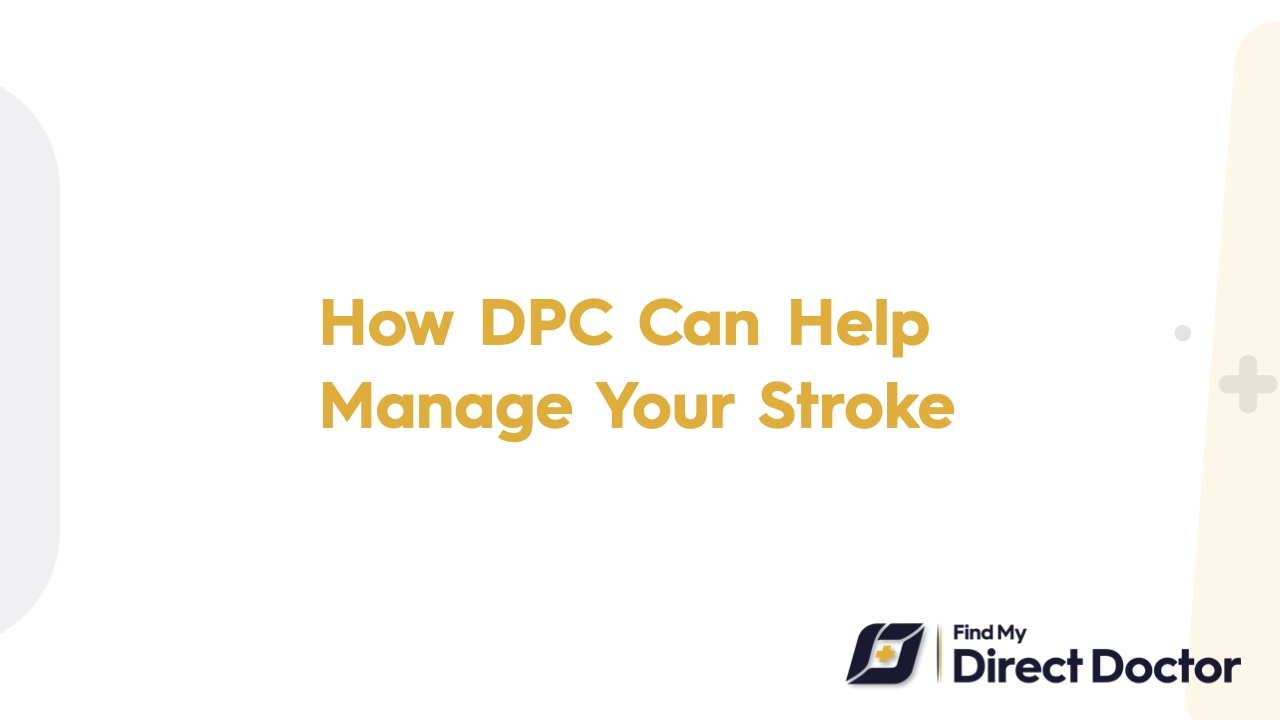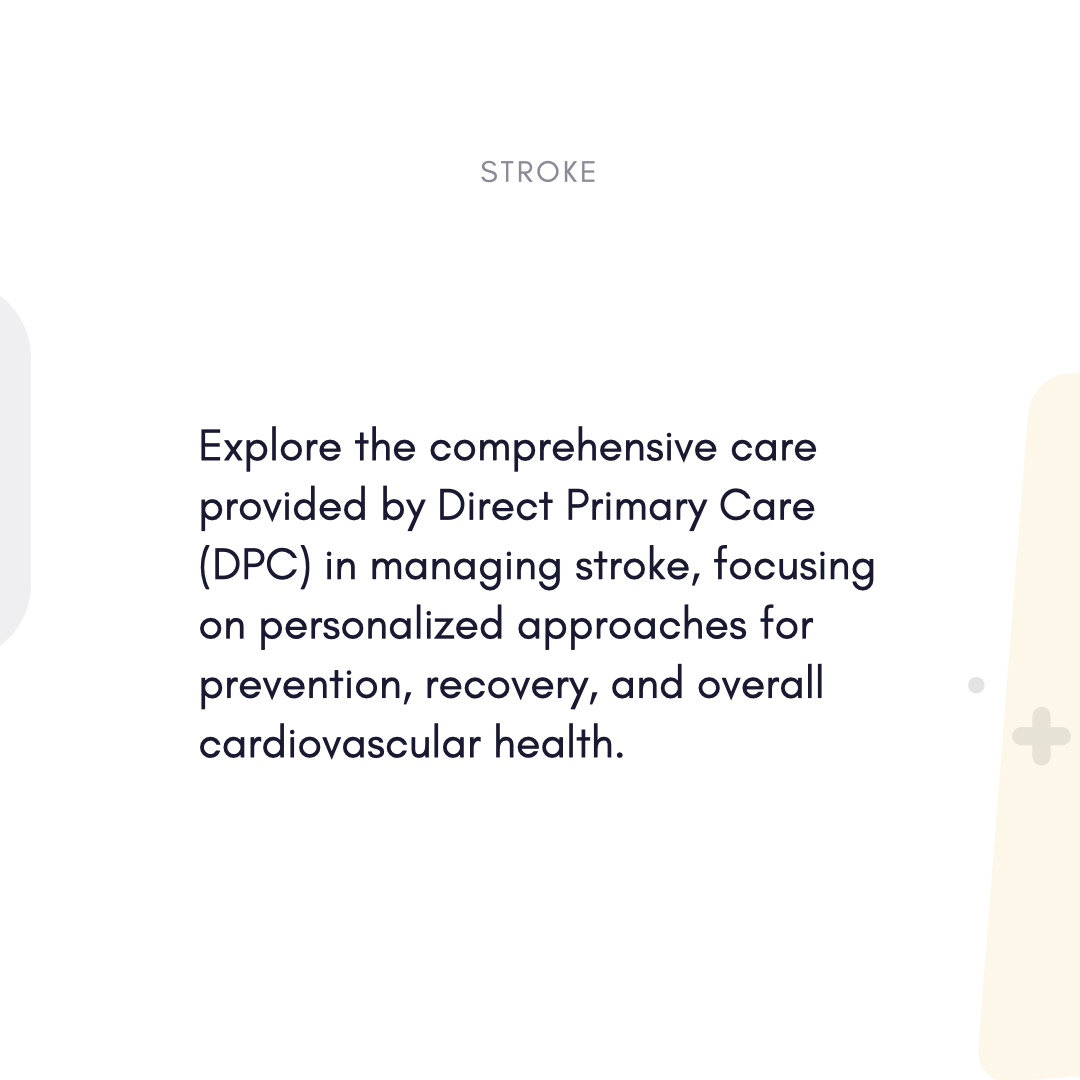Stroke Recovery and Direct Primary Care (DPC): A Lifeline for Prevention, Rehabilitation, and Long-Term Health
If you have ever seen a loved one suddenly lose vision, mobility, or speech—or if you have personally experienced the terrible aftermath of a stroke—you understand how important timely, coordinated care is. Every year, strokes claim 795,000 Americans; survivors run a 25% recurrence risk five years forward. Direct Primary Care (DPC), which combines proactive prevention, individualized rehab support, and cost transparency to protect your brain health, presents a transforming method for stroke management though.

Know Stroke and Its Long-Term Effects
Either a clot (ischemic) or bleeding (hemorrhagic) interrupting blood flow to the brain results in a stroke. Important risk elements consist:
- Diabetes, high cholesterol, hypertension
- Atrial fibrillation, smoking, weight loss
- Social considerations: Restricted healthcare availability and low income
Instant effects:
- Paralysis, trouble speaking, vision loss
- Cognitive deficit, emotional transformation
Long term hazards:
- One in four survivors had recurrent strokes.
- Depression, lifelong handicap, dementia
DPC's Transformational Effect Stroke Treatment
Under the membership model known as Direct Primary Care (DPC), consumers pay a monthly fee—usually between 50 USD and 150 USD—for unlimited access to their main care physician. For stroke survivors, this means no surprise bills, no waiting months for rehab follow-ups, and treatment centered on recovering freedom and stopping recurrence.
Here's why DPC distinguishes itself:
1. Preventive Active Risk Management and Control
Following American Heart Association recommendations, DPC doctors also:
- Strong risk factor control: Regular blood pressure checks, A1C monitoring, and lipid panels help to maintain numbers within target ranges.
- Medication adherence includes offering reasonably priced statins, anticoagulants (such as apixaban), and antihypertensives wholesale.
- Customized plans for diet, exercise, and smoking cessation form lifestyle coaching.
2. Perfect Post-Stroke Therapy
- By coordinating therapies—that is, working with cash-pay physical, speech, and occupational therapists—DPC clinics close gaps in traditional care.
- Mental health integration: CBT or support group therapy addresses post-stroke depression.
- 24/7 access: Changing prescriptions should spasticity or pain flare up during recovery.
3. Reasonably priced ongoing support
- No co-pays for regular medication adjustments or blood pressure checks.
- Discounted imaging: Carotid ultrasounds in hospitals cost 1,000 USD+; 200 USD here.
- ER visits avoided by means of quick telehealth consults for TIA scares.
DPC Benefits for Stroke Patients
Customized Prevention Strategies
- During each visit, DPC doctors dedicate 30 to 60 minutes developing plans including:
- Health measures unique to strokes: Monitoring NIH Stroke Scale ratings of cognitive ability.
- Dietary interventions include omega-3-rich Mediterranean diets meant to lower inflammation.
- Integration of technology: Wearables tracking atrial fibrillation or fall hazards.
Cost Reduction
- Generic drugs for 10 USD/month like clopidogrel instead of 75 USD+ with insurance.
- Saving 150 USD/session, physical therapy guides for at-home workouts.
- Avoidance of hospital readmissions by means of proactive risk control
Patient-Centered, All-Inclusive Treatment
- Social factors tackled: Linking patients to financial aid for medications or transportation options.
- Family schooling: Teaching those who look after others stroke warning signals (FAST: Face, Arms, Speech, Time).
- Advanced care planning: recording choices for next crises.
Success Stories from Real Life
- Case 1: Maria, 68, scheduled low-cost cardiac rehab and her DPC doctor optimized her blood pressure, so lowering her stroke recurrence risk by 80%.
- Case 2: James, 55, started preventative drugs right away after his DPC clinic managed a transient ischemic attack (TIA) via same-day telehealth, so avoiding 5,000 USD in ER expenses.
FAQs on DPC and Stroke Care
- Q: Can DPC manage acute stroke events?
- A: Although acute strokes depend on 911, DPC guarantees fast post-discharge treatment and tight risk control helps to prevent recurrence.
- Q: For survivors on a set income, is DPC reasonably priced?
- A: Sure. Many DPC clinics have sliding-scale fees, and members save 30–50% on specialists and drugs every year.
- Q: What should I do if I need a neurologist?
- A: Often 40% less than insured rates, DPC doctors speed referrals and negotiate cash-pay rates for consultations.
DPC Offers Stroke Patients a Win
The American Stroke Association stresses ongoing treatment to stop recurrence. DPC provides this via:
- Early risk detection: With good management, eighty percent of strokes are avoidable.
- Tools for survivors to recover confidence and independence.
- Simplifying treatment: One monthly payment pays for unlimited calls, visits, and care coordination.
Use DPC to help you rebuild your future.
One does not have to define their life by a stroke. Every checkup, every milestone, every day—every partner you acquire with DPC battles for your brain health, your independence, and your peace of mind.






